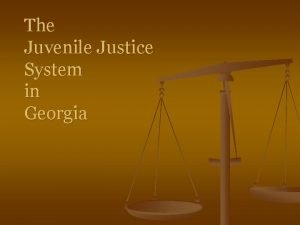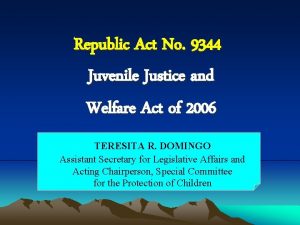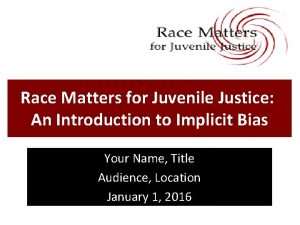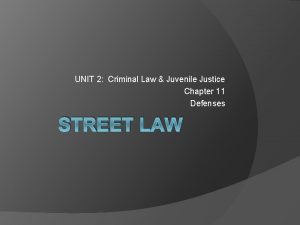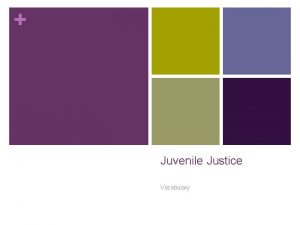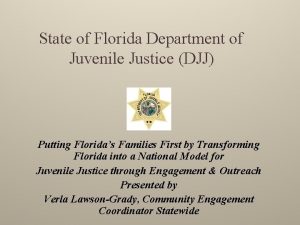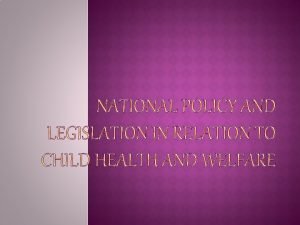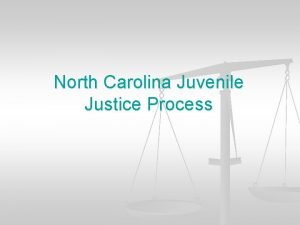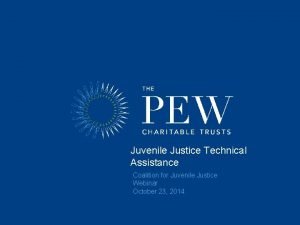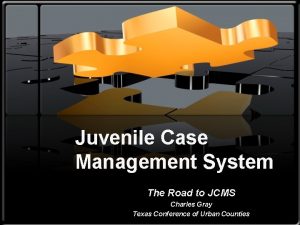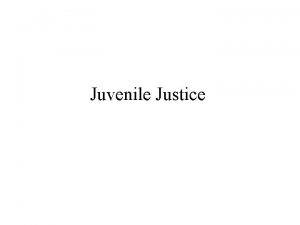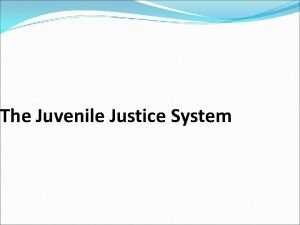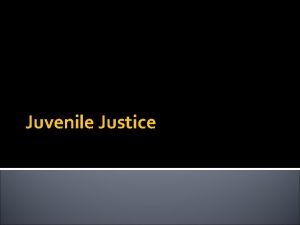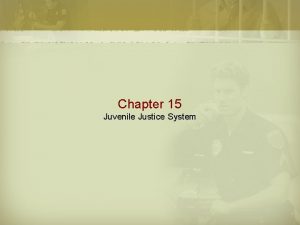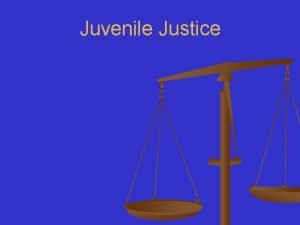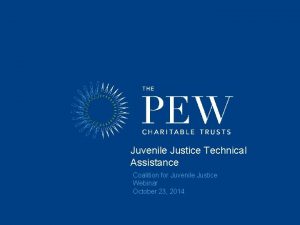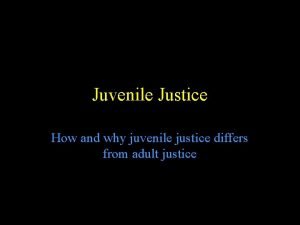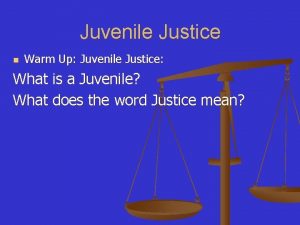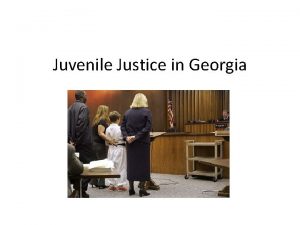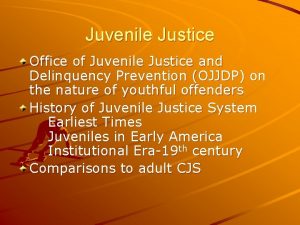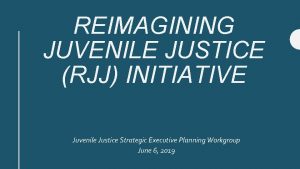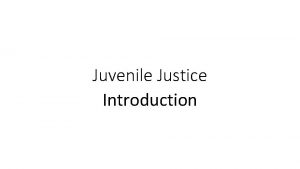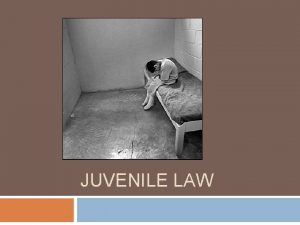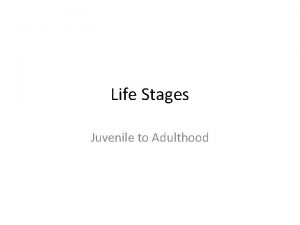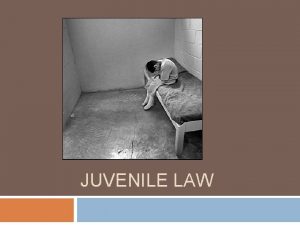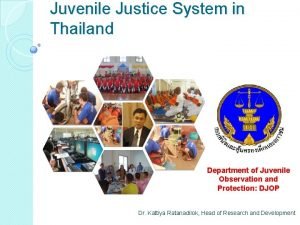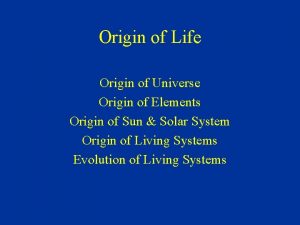JUVENILE JUSTICE SYSTEM ORIGIN OF THE JUVENILE JUSTICE























- Slides: 23

JUVENILE JUSTICE SYSTEM

ORIGIN OF THE JUVENILE JUSTICE SYSTEM • Before this system was established, adults and juveniles were treated the same as adults by courts and judges – Common Law Doctrine • A juvenile age 7 or older could be treated the same way as an adult • Same Court • Juveniles Housed in Prison with adults • Death Penalty

1800’S – FIRST SEPARATE INSTITUTIONS • Early 1800’s –To Separate Juveniles from Adults 1899 – FIRST JUVENILE COURT • Cook County Illinois ? Why should there be separate institutions for juvenile offenders?

PARENS PATRIAE “state as parent” – usually the district attorney

JUVENILE COURT JURISDICTION Authority granted by law to Hear a case

DEFINE: DELINQUENCY • Any behavior that is prohibited by juvenile law of a state • Juvenile court has jurisdiction over all acts of delinquency • Each state defines it differently, but there has to be two categories • 1. An act committed by a juvenile that would be defined as a crime if committed by an adult (theft, burglary, assault, robbery, etc. ) • 2. Status Offenses - an act that would not be a crime if committed by an adult, but an act of delinquency if committed by a juvenile (skipping school, running away, violating curfew, illegal purchase of alcohol, smoking, underage drinking, etc. ) ARIZONA DEFINITION (ADJC – Arizona Department of Juvenile Corrections)

DEFINE: JUVENILE • Each state has defined Juvenile • Only difference between juvenile and adult is age • “an individual who falls within a specified age range and is subject to the jurisdiction of juvenile court”

MAXIMUM AGE OF JURISDICTION WHAT IS THE MAXIMUM AGE OF JUVENILE JURISDICTION IN ARIZONA?

THE LANGUAGE OF THE JUVENILE JUSTICE SYSTEM

In the courts



THE JUVENILE JUSTICE SYSTEM

JUVENILE ARREST AND DETENTION PROCESS https: //www. youtube. com/watch? v=x. Ny. CB x 0_Dx 4

HOW DOES A JUVENILE GET INTO THE FORMAL SYSTEM • Law Enforcement – see the juvenile in a delinquent act • 1. Refer the Juvenile to Juvenile Intake, Or • 2. Refer the Juvenile into Diversion Program, where the juvenile could receive some type of service and be released to the parent • 3. If the juvenile is held in custody, the probation or prosecutor must review the allegations and make a decision as to the next step • A. Dismiss the case and release to parent • B. Handle the matter informally – Consent Decree • C. File a Petition formal intervention

CASES THAT ARE DISMISSED • • Usually minor offenses First-time Offenders Not enough evidence to prosecute 44% of all cases referred are dismissed and handled informally • Consent Decree – Juvenile agree to certain conditions in exchange for a dismissal • Pay restitution – a sanction by which a juvenile pays the victim for the harm done • Counseling • Community Service – sanction for volunteer work • Attend School • Obey Curfew • If the juvenile does not meet conditions, case referred formal proceedings

DETAINED OR RELEASED • Decide whether to detain or release to community • Most are not held prior to adjudication • Juveniles are held if: • Threat to Community • In danger if returned to community, harmed by others • Flight risk

THE FORMAL PROCESS Once an Intake Officer decides to process the juvenile formally

CASE IS GIVEN TO PROSECUTOR’S OFFICE 1. PROCECUTOR (Represents the State) • Receives and Reviews the Case • File a Petition, which states the allegations and ask the courts to adjudicate the juvenile • If the prosecutor does not file a petition, the case is dismissed at that time and the juvenile is released • Waive to Adult court, juvenile court relinquish jurisdiction to adult court and treated as a criminal in adult court, including the death penalty

IF A PETITION IS FILED 2. AJUDICATION AND DISPOSITION • Defined: Decision by a juvenile court judge that a juvenile committed the delinquent act • This usually has to be done within a tight time limit • After a juvenile has been determined delinquent, a juvenile court judge will hold a disposition hearing • The most common DISPOSITION is: • Probation – allows the juvenile to live in the community as long as he/she abide by certain conditions of probation. For a specific period of time • Attend School, Counseling, perform community service, pay victim restitution, etc. • If conditions are not met, PROBATION IS REVOKED AND THE CASE REFERRED BACK TO COURT!

CON’T DISPOSITION • Residential Placement – Another type of disposition • Juvenile is placed outside the home • Institution, Camp, Group Home, Residential Treatment • May be publically or privately owned • Once release – has to serve a period of AFTERCARE • Still under supervision • May be sent to Criminal Justice System from treatment facility if: • 1. Commits a crime while in the facility and has aged out • 2. Commits violent offense

PRISON KIDS https: //www. youtube. com/watch? v=B 8 c 1 La h. PSIA

 Georgia juvenile justice system
Georgia juvenile justice system Under 15 years old
Under 15 years old Juvenile justice system in georgia
Juvenile justice system in georgia Minnesota juvenile justice system
Minnesota juvenile justice system Race matters for juvenile justice
Race matters for juvenile justice Chapter 11 basic concepts street law
Chapter 11 basic concepts street law Cottage reformatories
Cottage reformatories State of florida department of juvenile justice
State of florida department of juvenile justice Expulsion
Expulsion Juvenile justice act 2000
Juvenile justice act 2000 North carolina juvenile justice process
North carolina juvenile justice process Coalition for juvenile justice
Coalition for juvenile justice Juvenile case management system
Juvenile case management system Hát kết hợp bộ gõ cơ thể
Hát kết hợp bộ gõ cơ thể Slidetodoc
Slidetodoc Bổ thể
Bổ thể Tỉ lệ cơ thể trẻ em
Tỉ lệ cơ thể trẻ em Voi kéo gỗ như thế nào
Voi kéo gỗ như thế nào Tư thế worm breton
Tư thế worm breton Hát lên người ơi alleluia
Hát lên người ơi alleluia Môn thể thao bắt đầu bằng từ chạy
Môn thể thao bắt đầu bằng từ chạy Thế nào là hệ số cao nhất
Thế nào là hệ số cao nhất Các châu lục và đại dương trên thế giới
Các châu lục và đại dương trên thế giới Công thức tiính động năng
Công thức tiính động năng
